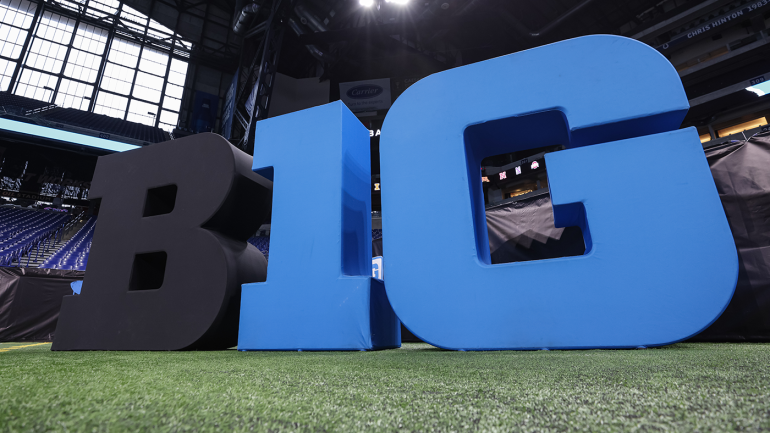
The Big Ten on Thursday announced a new seven-year media rights deal with CBS, Fox and NBC that begins July 1, 2023, and runs through the 2029-30 season. The multiplatform agreement is believed to be the largest in the history of college athletics with industry sources putting the approximate value of the deal at a record $1.2 billion annually.
Spanning five linear networks, including the Big Ten Network and FS1, the deal positions the Big Ten with three premier windows to show college football games on broadcast television. Fox will air a featured "Big Noon" game on Saturdays at noon ET with CBS following at 3:30 p.m. and NBC wrapping up each week with "Big Ten Saturday Night" in primetime.
"The Big Ten will be a dominant force from a media standpoint on Saturday," said Big Ten commissioner Kevin Warren, who oversaw the deal only 2 ½ years into his tenure.
This will create an "unprecedented opportunity for Big Ten football," according to CBS Sports chairman Sean McManus, who cited the league's ability to have games in each of the best telecast windows across three traditional broadcast networks.
"From the moment we didn't renew our SEC rights, we targeted the Big Ten for both football and basketball," McManus continued. "It was important for us to continue to program the 3:30 window on Saturday afternoon, which has been the highest-rated window for many years in all of college football."
CBS, which will be in the final year of its SEC deal in 2023, will air seven Big Ten football games in various windows that season before expanding to a full schedule of 14-15 games annually from 2024-29. The Big Ten will have an exclusive 3:30 p.m. window on CBS from 2024 onward and the ability to air as many as two games on Black Friday, the day after Thanksgiving. CBS will also air the Big Ten Championship Game in 2024 and 2028. All CBS games will be live streamed on Paramount+.
CBS has been the highest-rated college football network since 2009.
Big Ten football broadcasting
| CBS | Fox/FS1 | NBC | BTN | Peacock | |
|---|---|---|---|---|---|
2023 games | 7 | 24-27 | 16 | 38-41 | 8 |
2024-29 games | 14-15 | 30-32 | 14-15 | 50 (max) | 8 |
Championships | 2024, 2028 | 2023, 2025, 2027, 2029 | 2026 | -- | -- |
Industry insiders expressed surprise Fox did not end up with all seven championship football games. Those added significant value to the deal for CBS and NBC.
"That was really important to us," McManus explained. "When you have the championship game in that particular year, you have a sales increase because of the 'halo effect' [enhancing the brand]. Having two [championship games] is great."
The SEC began its dominance of college football in 2006, winning 12 of 16 national championships. CBS has held SEC rights since 1996.
"A lot of credit goes to CBS," said McManus regarding the establishment of the all-important 3:30 p.m. window. "SEC provided terrific football, but the overall consistency we had in that window and the production values have really contributed to making it what it is."
The 2023 season will be unique for college football fans watching on CBS. The network will broadcast both SEC and Big Ten games before transitioning to a full Big Ten schedule in 2024. The seven Big Ten games airing on CBS in 2023 will be an addition to a full schedule of 15 SEC games, including the SEC Championship Game, that season.
McManus said at least a couple of the Big Ten games airing on CBS next season would be scheduled for Weeks 1 and 2. Those are open windows because the SEC on CBS typically begins in Week 3. Big Ten games may also be shown on Black Friday as well as part of an SEC-Big Ten doubleheader on certain Saturdays.
"We're firm believers in the values of broadcast TV," McManus said. "When you think about the Big Ten coming on at noon on Fox, coming on at 3:30 on CBS and coming on at 8 on NBC, all on broadcast television, that says a lot about the power of broadcast."
Hello, @B1Gfootball.
— CBS Sports (@CBSSports) August 18, 2022
Hit the music. pic.twitter.com/PbMHPql1Cz
When USC and UCLA join the Big Ten in 2024, each of the 16 Big Ten schools will receive an average of $75 million annually from media rights. That does not include revenue from the College Football Playoff, bowl games or the NCAA Tournament, which can vary from school-to-school. All media rights deals are typically backloaded, peaking in the final years of the agreements.
The SEC is expected to have a similar payout when its new contract with ESPN begins in 2024. Based on projected payouts of the remaining eight FBS conferences, those two leagues will be ahead of the other Power Five conferences with payouts earning their programs at least $30 million more annually.
"It's P2 [Power Two] and everybody else," said an FBS source familiar with TV negotiations. "I don't know why anybody is using P5 [Power Five] anymore."
CBS, which has aired Big Ten men's basketball for the last 32 years, will continue to be the home for the men's championship game and Big Ten tournament semifinals. It adds the women's championship game to its rights package for the first time in 2023-24. CBS will broadcast 9-11 men's basketball games in 2023-24 before extending to 15 games starting in 2024-25 through the end of the deal. All CBS games will be live streamed on Paramount+. The Big Ten on CBS is the highest-rated men's regular-season college basketball package on TV.
"CBS has been an incredible partner to the Big Ten Conference and today we strengthen our partnership to include Big Ten football, men's basketball and our women's basketball tournament," Warren said. "We are thrilled to continue our work with their world-class team specifically Sean McManus, David Berson, Dan Weinberg and Bess Barnes. We deeply value our relationship and their commitment to our fans, conference, member institutions and student-athletes."
Fox/FS1, the Big Ten Network and Peacock will air the remainder of the men's basketball and women's basketball games as well as Olympic sports.
"I'm extremely excited about [the deal] because I think every party involved was able to accomplish the goals they came to the table with," Warren said. "I think that's one of the first attributes of a good negotiation, when everyone walks away very pleased that they accomplished the goals."
Additional Big Ten media rights details
Which networks will air which games? The Big Ten and Fox will coordinate a "draft" with games being chosen by the networks across each of the seven years of the deal. Fox will have the first pick each year, a source told CBS Sports, meaning the network will likely will end up the crown jewel of the intraconference matchups: Michigan vs. Ohio State. CBS and NBC will trade off the second and third picks in various years, according to sources.
Will ESPN be left out? Starting in 2024, ESPN will not be airing intraconference Big Ten football games or home basketball games for the first time in 40 years. Given the Big Ten has a quarter of the United States' population in its footprint, that's significant for both the conference and ESPN. Some Big Ten nonconference games that include ACC, Big 12, Pac-12 and SEC opponents will still air on ESPN, per those media agreements.
Warren did not express concern when asked whether he expects his conference to be covered in the same way by ESPN. "We have a 40-year relationship with them," he said. "Life is long. They're professionals. Inherent in our scheduling we're going to play schools from the ACC, SEC, Big 12 and Pac-12. We still have to address the ACC-Big Ten Challenge. … ESPN is such a prominent partner in college athletics. We'll always have a partnership with them."
Major media markets, coast-to-coast: In announcing Thursday's deal, the Big Ten said the addition of USC and UCLA in 2024 allows the conference to "reach the broadest audience in the country." Adding Los Angeles to the conference footprint, the Big Ten will now have a significant presence in the nation's three biggest media markets: New York, Chicago and L.A.
"It just made the Big Ten that much more attractive to us," McManus said. "I know the games haven't been solidified yet, [but] when you think of Michigan-USC or Penn State-USC or Ohio State-UCLA, it really cements the national nature of the conference."





















